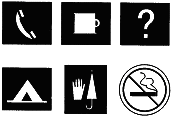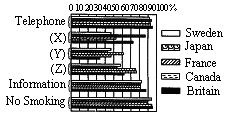题目内容
Travelers that they should bring their ID cards with them.
A. have reminded B. are reminded
C. were reminding D. had been reminded
B
考查动词的时态和语态。此处根据句意应为被动语态,因旅行者被提醒。

| Travel Tips from the Budget Traveler Plan in advance. Passengers planning to travel by plane or train should buy their tickets at least one week before the trip. You can save money that way. There are often special airfares and rail fares if you buy your ticket more than 7 days or 14 days in advance. Shop around. Not all travel agencies or airlines change the same amount of money for airline tickets to the same place. It’s a good idea to call several different places to get the best deal. Sometimes you can find really good flight prices on the Internet. Stay over a Saturday night. Some airlines offer low airfares if you stay over a Saturday night. This is because they want to attract the pleasure travelers. Pleasure travelers are usually able to stay over on a Saturday night. Business travelers usually want to be home with their families on Saturday nights. Take a boat. For some destinations, traveling by plane is not the only choice available. Most people travel from Japan to Korea or China, for example, by plane. This is because plane travel is quick and convenient. But you can make the journey by boat, instead. It takes more time, of course, but there are usually cheap deals for boat passengers—and you have lots of time to enjoy the journey. Travel with a friend or in a group. Traveling in a group is often a good way to save money. If you travel in a group of 10 or more, you can usually get a good deal from airlines. Also, when you rent a car, you can share the cost instead of paying for it yourself. In addition, sharing with another traveler can help get a cheap room price at a hotel. Join a Frequent Travel Program. Many airlines offer special programs for regular travelers. These are called “Frequent Travel Programs” or “Frequent Flyer Programs”. Every time you take their plane, you get points. When you have enough points, you can get free flights from the airline. 1. A cheaper air ticket may be got by all of the following means EXCEPT ______. A. trying different travel agencies and airlines B. buying a ticket ahead of time C. buying a ticket on line D. shopping around the city 2. To get a cheap deal on a flight, which of these trips should you choose? A. Leave on Thursday and return on Sunday afternoon. B. Leave on Monday and return on Wednesday. C. Leave on Wednesday and return on Saturday morning. D. Leave on Friday and return on Saturday night. 3. The writer suggests taking a boat from Japan to Korea mainly because ______. A. it’s comfortable to take a boat B. the scenery on the sea is beautiful C. it’s cheap and you can enjoy the journey D. it is not far from Japan to Korea 4. Which of the statements is TRUE according to the passage? A. The writer recommends traveling in a group as a good way to save money. B. All airlines offer special programmes for regular travelers. C. Joining a Frequent Traveler Programme can help you get flights for free every time. D. The writer suggests renting a car as a great way to travel for free.
|

